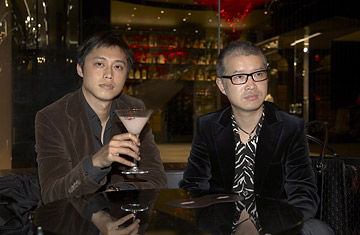
Richard Weng, left, and Michael Lu socialize at Shanghai's Dolce & Gabbana Martini Bar.
It's early evening on the Bund in Shanghai, and Richard Weng and Michael Lu, both 30, are kicking back at the Dolce & Gabbana Martini Bar, a dark little boîte sandwiched between the brand's vast mens- and womenswear stores on China's most impressive waterfront property.
Surprisingly, the bar, which features low leather banquettes snaking over a mirror-tiled floor, has no view of the skyscrapers across the Huangpu River that have soared up from what were paddy fields only 15 years ago. But this bar's customers aren't here for the sightseeing; they come for the laid-back vibe and perhaps for some late-night shopping—the bar serves until 2 a.m., and it's not unusual for a VIP to get special access to Dolce & Gabbana into the wee hours. "It's good to shop when we feel like it," says Weng, taking a sip of his martini.
Weng, a p.r. consultant for foreign luxury brands like Tiffany, moved here two years ago from Taiwan. "When I was growing up, I always thought I would go to New York," he says. His decision to go to mainland China instead is no surprise to his Shanghai-born friend Lu, who calls the city a 21st century Manhattan.
The next day, Xiaojia Wang (known as X.J.) is explaining over a light lunch that she too is drawn by Shanghai's palpable energy. Born in Beijing, she attended the London College of Fashion and worked there as a fashion merchandiser. "I came back to China because even in London, people were talking about moving to Shanghai," she says. This Vivienne Westwood-loving 29-year-old advises Adidas on its strategies for the local market. For X.J., the attraction of Shanghai is a no-brainer. "You have the feeling here that it's China's turn now," she says.
A confessed clothes addict, X.J. explains that the upside of shopping in Shanghai is that you can find pieces that are sold out elsewhere. But the downside is the service. "The salespeople chat about their lunch in front of you, and they have no professional knowledge; the customer knows more than they do."
Despite what you hear about the prevalence of imitation bags in China, this generation isn't interested. "Foreigners always ask about fakes, but they're the only ones I know buying them," says X.J. "Fakes!" Lu almost spills his martini when asked whether he owns any. He carries bags by Dunhill and Dolce & Gabbana, and this spring he plans to order the Hermés Birkin—in the largest size. To him, it's the ultimate manbag. The price? "A lot," he says, then smiles.